LASSCO Archive
2932 items found
Page 69 of 245
-
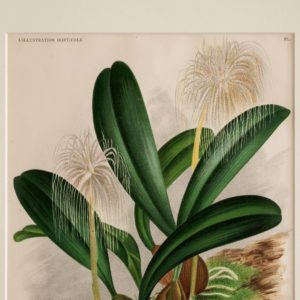
Linden Botanicals
Linden Botanicals
L’Illustration Horticole, was a monthly horticultural review, founded in 1854 in Ghent, Belgium, by Ambroise Verschaffelt, a nurseryman who specialised in new plant introductions from South America. The lavish illustrations were produced by some of the very best botanical artists and lithographers – A. Goosens, P. De Pannemaeker and J. Goffart. The L’Illustration Horticole although founded by Jean Jules Linden (1817 – 1898) became a collaborative effort of many great horticulturists and field botanists of the day. Jean Linden in his own right was a renowned orchid grower and collector. Each monthly edition featured chromolithograph of botanical prints. Plants such as orchids, camellias, roses and leafy plants such as ferns and palm trees were represented. The magazine’s scope included pictures, descriptions, the history and culture of “the most remarkable plants,” new introductions, horticultural history, botanical expeditions, and accounts of the major expositions and of new works on botany and horticulture as well as garden descriptions and layouts. -
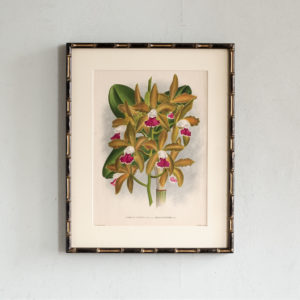
Linden Botanicals
Linden Botanicals
L’Illustration Horticole, was a monthly horticultural review, founded in 1854 in Ghent, Belgium, by Ambroise Verschaffelt, a nurseryman who specialised in new plant introductions from South America. The lavish illustrations were produced by some of the very best botanical artists and lithographers – A. Goosens, P. De Pannemaeker and J. Goffart. The L’Illustration Horticole although founded by Jean Jules Linden (1817 – 1898) became a collaborative effort of many great horticulturists and field botanists of the day. Jean Linden in his own right was a renowned orchid grower and collector. Each monthly edition featured chromolithograph of botanical prints. Plants such as orchids, camellias, roses and leafy plants such as ferns and palm trees were represented. The magazine’s scope included pictures, descriptions, the history and culture of “the most remarkable plants,” new introductions, horticultural history, botanical expeditions, and accounts of the major expositions and of new works on botany and horticulture as well as garden descriptions and layouts. -

Linden Botanicals
Linden Botanicals
L’Illustration Horticole, was a monthly horticultural review, founded in 1854 in Ghent, Belgium, by Ambroise Verschaffelt, a nurseryman who specialised in new plant introductions from South America. The lavish illustrations were produced by some of the very best botanical artists and lithographers – A. Goosens, P. De Pannemaeker and J. Goffart. The L’Illustration Horticole although founded by Jean Jules Linden (1817 – 1898) became a collaborative effort of many great horticulturists and field botanists of the day. Jean Linden in his own right was a renowned orchid grower and collector. Each monthly edition featured chromolithograph of botanical prints. Plants such as orchids, camellias, roses and leafy plants such as ferns and palm trees were represented. The magazine’s scope included pictures, descriptions, the history and culture of “the most remarkable plants,” new introductions, horticultural history, botanical expeditions, and accounts of the major expositions and of new works on botany and horticulture as well as garden descriptions and layouts. -
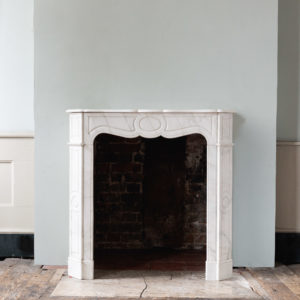
Carrara marble pompadour fireplace,
Carrara marble pompadour fireplace,
with shaped shelf, the frieze and jambs with channel moulded detail. -
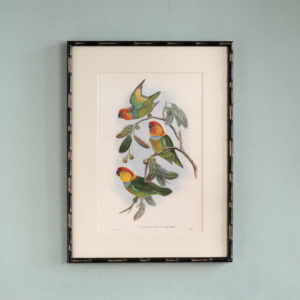
Birds of New Guinea by John Gould,
Birds of New Guinea by John Gould,
John Gould (1804-1881) was born in Lyme Regis, Dorset, the son of John Gould, a gardener, and his wife Elizabeth Clatworthy. Gould’s training was as a taxidermist rather than an artist, and in 1828 he was appointed animal preserver at the museum of the Zoological Society of London. In 1838-1840, Gould and his family went to the then relatively unknown continent of Australia, with the purpose of collecting and studying specimens. During his time there he discovered hundreds of new bird species and subspecies. As a result of the findings the fascinating works Birds of Australia and Mammals of Australia were published. Subsequently he was considered as the father of bird study in Australia. Gould himself did not execute finished drawings for any of his works, only providing rough pencil or watercolour sketches with notes for his artists to work from. The artists he employed included his wife Elizabeth, Edward Lear, Joseph Wolf, Henry Richter and Joseph Hart. -
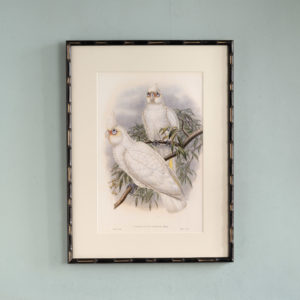
Birds of New Guinea by John Gould,
Birds of New Guinea by John Gould,
John Gould (1804-1881) was born in Lyme Regis, Dorset, the son of John Gould, a gardener, and his wife Elizabeth Clatworthy. Gould’s training was as a taxidermist rather than an artist, and in 1828 he was appointed animal preserver at the museum of the Zoological Society of London. In 1838-1840, Gould and his family went to the then relatively unknown continent of Australia, with the purpose of collecting and studying specimens. During his time there he discovered hundreds of new bird species and subspecies. As a result of the findings the fascinating works Birds of Australia and Mammals of Australia were published. Subsequently he was considered as the father of bird study in Australia. Gould himself did not execute finished drawings for any of his works, only providing rough pencil or watercolour sketches with notes for his artists to work from. The artists he employed included his wife Elizabeth, Edward Lear, Joseph Wolf, Henry Richter and Joseph Hart. -
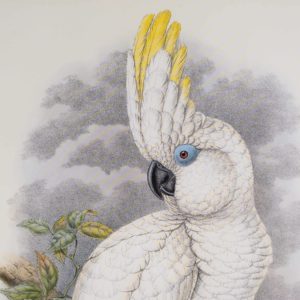
Birds of New Guinea by John Gould,
Birds of New Guinea by John Gould,
John Gould (1804-1881) was born in Lyme Regis, Dorset, the son of John Gould, a gardener, and his wife Elizabeth Clatworthy. Gould’s training was as a taxidermist rather than an artist, and in 1828 he was appointed animal preserver at the museum of the Zoological Society of London. In 1838-1840, Gould and his family went to the then relatively unknown continent of Australia, with the purpose of collecting and studying specimens. During his time there he discovered hundreds of new bird species and subspecies. As a result of the findings the fascinating works Birds of Australia and Mammals of Australia were published. Subsequently he was considered as the father of bird study in Australia. Gould himself did not execute finished drawings for any of his works, only providing rough pencil or watercolour sketches with notes for his artists to work from. The artists he employed included his wife Elizabeth, Edward Lear, Joseph Wolf, Henry Richter and Joseph Hart. -
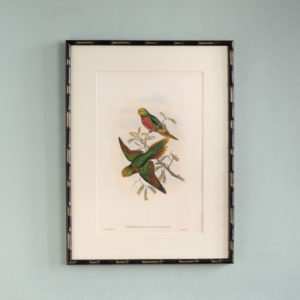
Birds of New Guinea by John Gould,
Birds of New Guinea by John Gould,
John Gould (1804-1881) was born in Lyme Regis, Dorset, the son of John Gould, a gardener, and his wife Elizabeth Clatworthy. Gould’s training was as a taxidermist rather than an artist, and in 1828 he was appointed animal preserver at the museum of the Zoological Society of London. In 1838-1840, Gould and his family went to the then relatively unknown continent of Australia, with the purpose of collecting and studying specimens. During his time there he discovered hundreds of new bird species and subspecies. As a result of the findings the fascinating works Birds of Australia and Mammals of Australia were published. Subsequently he was considered as the father of bird study in Australia. Gould himself did not execute finished drawings for any of his works, only providing rough pencil or watercolour sketches with notes for his artists to work from. The artists he employed included his wife Elizabeth, Edward Lear, Joseph Wolf, Henry Richter and Joseph Hart. -
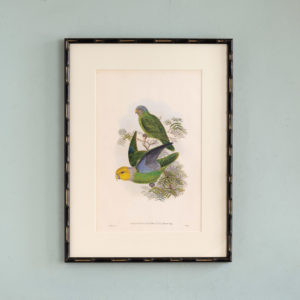
Birds of New Guinea by John Gould,
Birds of New Guinea by John Gould,
John Gould (1804-1881) was born in Lyme Regis, Dorset, the son of John Gould, a gardener, and his wife Elizabeth Clatworthy. Gould’s training was as a taxidermist rather than an artist, and in 1828 he was appointed animal preserver at the museum of the Zoological Society of London. In 1838-1840, Gould and his family went to the then relatively unknown continent of Australia, with the purpose of collecting and studying specimens. During his time there he discovered hundreds of new bird species and subspecies. As a result of the findings the fascinating works Birds of Australia and Mammals of Australia were published. Subsequently he was considered as the father of bird study in Australia. Gould himself did not execute finished drawings for any of his works, only providing rough pencil or watercolour sketches with notes for his artists to work from. The artists he employed included his wife Elizabeth, Edward Lear, Joseph Wolf, Henry Richter and Joseph Hart. -
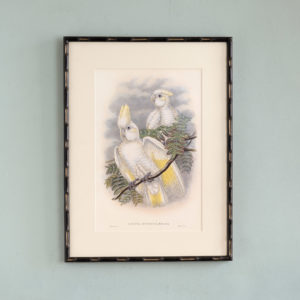
Birds of New Guinea by John Gould,
Birds of New Guinea by John Gould,
John Gould (1804-1881) was born in Lyme Regis, Dorset, the son of John Gould, a gardener, and his wife Elizabeth Clatworthy. Gould’s training was as a taxidermist rather than an artist, and in 1828 he was appointed animal preserver at the museum of the Zoological Society of London. In 1838-1840, Gould and his family went to the then relatively unknown continent of Australia, with the purpose of collecting and studying specimens. During his time there he discovered hundreds of new bird species and subspecies. As a result of the findings the fascinating works Birds of Australia and Mammals of Australia were published. Subsequently he was considered as the father of bird study in Australia. Gould himself did not execute finished drawings for any of his works, only providing rough pencil or watercolour sketches with notes for his artists to work from. The artists he employed included his wife Elizabeth, Edward Lear, Joseph Wolf, Henry Richter and Joseph Hart. -
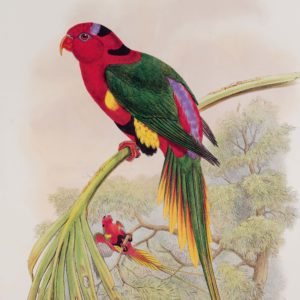
Birds of New Guinea by John Gould,
Birds of New Guinea by John Gould,
John Gould (1804-1881) was born in Lyme Regis, Dorset, the son of John Gould, a gardener, and his wife Elizabeth Clatworthy. Gould’s training was as a taxidermist rather than an artist, and in 1828 he was appointed animal preserver at the museum of the Zoological Society of London. In 1838-1840, Gould and his family went to the then relatively unknown continent of Australia, with the purpose of collecting and studying specimens. During his time there he discovered hundreds of new bird species and subspecies. As a result of the findings the fascinating works Birds of Australia and Mammals of Australia were published. Subsequently he was considered as the father of bird study in Australia. Gould himself did not execute finished drawings for any of his works, only providing rough pencil or watercolour sketches with notes for his artists to work from. The artists he employed included his wife Elizabeth, Edward Lear, Joseph Wolf, Henry Richter and Joseph Hart. -
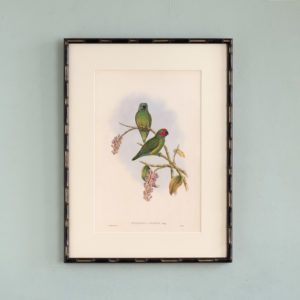
Birds of New Guinea by John Gould,
Birds of New Guinea by John Gould,
John Gould (1804-1881) was born in Lyme Regis, Dorset, the son of John Gould, a gardener, and his wife Elizabeth Clatworthy. Gould’s training was as a taxidermist rather than an artist, and in 1828 he was appointed animal preserver at the museum of the Zoological Society of London. In 1838-1840, Gould and his family went to the then relatively unknown continent of Australia, with the purpose of collecting and studying specimens. During his time there he discovered hundreds of new bird species and subspecies. As a result of the findings the fascinating works Birds of Australia and Mammals of Australia were published. Subsequently he was considered as the father of bird study in Australia. Gould himself did not execute finished drawings for any of his works, only providing rough pencil or watercolour sketches with notes for his artists to work from. The artists he employed included his wife Elizabeth, Edward Lear, Joseph Wolf, Henry Richter and Joseph Hart.
